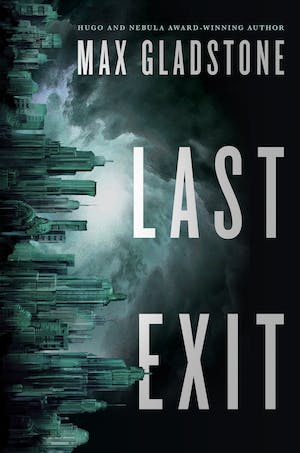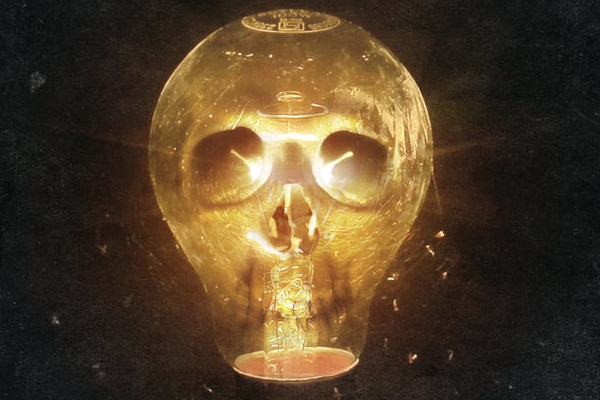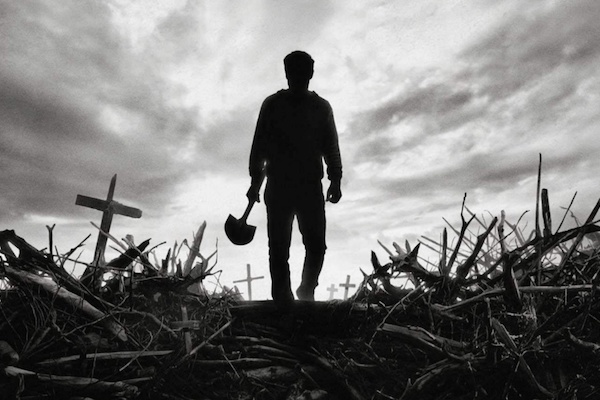Welcome back to Reading the Weird, in which we get girl cooties all over weird fiction, cosmic horror, and Lovecraftiana—from its historical roots through its most recent branches. This week, we continue Max Gladstone’s Last Exit with Chapters 9-10. The novel was first published in 2022. Spoilers ahead!
A feverish Zelda dreams of walking on a path of black flowers, toward a waiting woman tall as a cliff. Her white dress stains red as it trails over the flowers. She clenches an iron ring. As a “terrible momentum” drags her forward, Zelda aches for the woman, very much afraid. A voice whispers behind her, but the ghost is gone when she looks back. She falls into the bleeding mud as she reaches for the woman “who was a tower who was the sky.”
Zelda wakes in a motel room, where she’s spent years sweating into the bedsheets. She calls for June, but it’s Sarah who answers. Tearing up, Zelda tells Sarah how much she missed her. Sarah remains coldly professional as she tends to Zelda’s beetle-bitten arm. From the wound, she extracts a squirming black filament of rot and shrivels it in candle flame. Antibiotics will do the rest, and sleep.
Sarah and June sit in the hallway overlooking the road. June tells how Zelda collapsed in Pennsylvania; disregarding Zelda’s warning against using phones, June called for help. That was when the faceless man in the white hat appeared. June hauled Zelda into the Subaru and, though unlicensed, gunned the car into motion. The cowboy kept reappearing ahead of them. With Zelda unresponsive, June remembered how they had alt-jumped from the bridge in NYC, and she pushed into another reality, one of burning forests, monstrous birds, and endless lonesome roads.
Congratulations, Sarah says. June has the knack for alt-jumping. Sarah talks about her first jump. She was angry, because Zelda (perhaps inadvertently) had jumped her without her consent. They landed in a Yale campus turned wasteland. Pursued by “lizard-monkey things,” they escaped into a “tomb” hideout of the Skull and Bones secret society. For three days they were stuck there, with Zelda infuriating Sarah by treating their plight like an adventure. The lizard-monkeys drove them into a casket. Sarah, realizing Zelda was as scared as her, as eager to return to Sal, helped “hitch” them back to their own world.
Sarah urges June to go home. It’s the original road-riders who started this apocalypse, they who must fight it. June counters that they found the rot, they didn’t make it.
Outside the window, the road ripples like a sun-mirage. Then the Challenger appears, and it’s on fire.
* * *
Ramon has missed the alt-road, where “gravity went not down but forward”. The Challenger tells him he’s not the “nice boy” he wishes he were. He’s the “hidden honest self. The self that wants to burn it all down.” Coming back to his own world to gas up, he’s attacked by two roughnecks who mistake him for an easy target. Ramon could use his knack to escape. Instead he uses it to beat the two men unconscious. Trying on one opponent’s black Stetson, he sees reflected in his car window a white-hatted cowboy.
He jumps into the Challenger and drives through the night. Near Las Vegas, he glimpses the cowboy on a billboard. Later he spots a hitchhiker holding a sign lettered MONTANA. It’s Ish, hardened into the billionaire CEO Ramon’s seen in pictures, but still the man who out in the alts risked his life to save Zelda.
Ramon picks Ish up. He remembers how he and Ish bonded as Yale freshmen looking for a place to belong. Ish had “a full round honesty” back then; a body that seemed always to be apologizing for itself, “powerfully charming, powerfully sweet.” Ramon studied applied math and economics, intending to become a “future-brain” billionaire. Ish took his math pure and theoretical, yet they complemented each other, helped each other through academic difficulties as well as personal ones.
Ish’s biggest personal crisis came when he confessed to falling for another student he pseudonamed “Alice.” Ramon enlisted Sal to tutor Ish in romancing her. The climax of their efforts came when it turned out “Alice” was really Zelda, whom Sal was also crazy about—a passion Zelda demonstrably returned. Ish never confessed his love to Zelda, instead demonstrating it on the alt-road. Ramon knows that if he’d agreed to continue after Sal’s fall, Ish would have done so, too. But Ramon feared Ish would die, or else turn sour. So Ramon walked away.
At the roadhouse, Ish asks Ramon why he’s answering Zelda’s summons. It’s because he knew Ish would, but he answers jokingly: “Who doesn’t want to save the world?” Their reunion goes downhill when Ramon takes Ish to task over creating Lidskjalf, in effect selling the One Ring to Sauron. It was to help Zelda close cracks remotely, Ish pleas. Ramon remains unconvinced.
Ramon suddenly notices a jukebox that wasn’t there earlier. Before it stands the cowboy, and Ish sees him, too. Two guys playing pinball fall under the cowboy’s influence and attack. With Ish fighting like an action hero, they incapacitate the pinballers, but facing down the cowboy himself is not an option. They rush to the Challenger, hit the road—
And are gone.
Against the Rot: Part of how we handle apocalypses is to talk about them around the dinner table, and to change the stories we tell about the land.
What’s Cyclopean: Zelda sees “love” as “a totem you brought out to parade before your parents”—for Sal she needs another word describing “that strange enormous knot of sex and death and poetry and hunger, the churning engine under the skin.”
The Degenerate Dutch: Skull and Bones kept “the actual human skull of actual Apache leader and genocide victim Geronimo” as a trophy. Only now they’ve got the skull from monkey-monster world instead. The gang returned Geronimo’s skull home on their first road trip.
Libronomicon: Sarah dredges up a King Lear quote while dealing with Zelda’s wound: Kent recognizing “authority” in Lear’s countenance. Ramon imagines a very different kind of authority for himself: Kubla Khan’s “Beware! Beware! His flashing eyes, his floating hair!”
Madness Takes Its Toll: Ramon also says that “the real horror” is when the world is full of irrational choices, “lies turn true when you say them loudly and people clap,” and “all of a sudden you’ve gone sane.”
Ruthanna’s Commentary
The world is ending—but apocalypse is a state of being, not a moment. “Pass the corn,” Sarah’s family doesn’t say around the dinner table: “Do you ever think about how we’re living after the end of the world?” Corn, of course, being one of the artifacts of life before that particular apocalypse. June says “most people don’t do shit” about the end of the world, a bit of teenaged cynicism that Sarah finds hard to argue with—but it’s not always obvious when people are doing something, or indeed whether what they’re doing is actually useful.
So we come again to the question: what should you do about it? Break through the walls of reality? Make Faustian bargains to hold back the worst nightmares? Set it all on fire, as Ramon suggests? Magic means trusting your perception over your judgment, but interpreting and responding to perceptions without judgment is impossible. You can’t act without the possibility, even likelihood, of screwing up badly.
Yale, as depicted here, is a place that people come to “do shit.” But it’s also a place of bargains, promising of power if “you agreed to matter in a very specific way.” It offers an illusion of more certainty, more control, than is actually possible, and the results are as likely to bring the end closer as hold it off. It’s a place of hunger, where most students lean hard into that bargain.
It sure is interesting that Zelda and company ultimately went for the power of uncertainty, of nothing being set in stone. Certainty is a cage, on both sides of the bars. What holds the rot out, holds us in. And what lets us out…
Ramon thinks of himself, like Sarah, as projecting the illusion of niceness over a truth of destructive fury. Unlike Sarah, he thinks maybe that fury is the right response. Sal teaches Ish to hide his anger, pointing out that she’s doing the same. Fury and fear, fear and fury, both reasonable responses to the end of the world and both potentially terrible in their results. Ramon thinks he walked away to save Ish from dying. He’s angry at Ish for wasting that life, becoming “the biggest and smartest scared little boy in increasingly richer rooms of big, scared, smart little boys,” helping “monsters and spies” make people even more scared. Ish thinks of himself as making a Faustian bargain to keep the rot out. Round and round they go, fear and fury and bargains and illusions…
Speaking of Ish, why is he hitchhiking? My first thought was that all his fancy cars were too computerized, too much built around a skeleton of his own tracking algorithms. Then I remembered the recent report that your car may collect more information about you than your phone. The Challenger, rebuilt from the ground up, is probably not reporting in—but for most of us, even with GPS off and phones tossed onto the median, uncertainty on the road is mere illusion.
Back to the question of how to respond to the end of the world: if you’re going to do it right, you need to know what kind of end you’re facing. It’s easy to demand that characters be genre-savvy, but which genre? That question runs through Last Exit, as the gang argues over whether they’re doing magic or math, as they jump into worlds with dinosaurs and eldritch abominations and giant apocalyptic machines. One moment you might be in a horror story, hidden in a casket with lizard-monkeys beating on the outside. The next, with luck, you’ve pushed through the boundary into dark humor, with Skull and Bones bros having a stoned assignation atop the lid. June argues with Zelda about whether they’re in a single-hero action movie, or an Avengers film with “a whole pile of people to make this thing happen”. But the biggest such question remains unanswered: Are we in a genre where meaningful action and a hopeful ending are possible, or… not that?
Anne’s Commentary
Dream sequences are killers to write, and too often, to read. Think about a time when you tried to convey in spontaneous speech the vividness and emotional intensity of an important dream. It’s probable that your descriptions were pallid shadows compared to the experienced dreamscape, and that you struggled to inspire any real sense of the wonder, terror, squalor, ecstasy, even revelation that you took from the vision. It’s probable you either rambled on until your listener’s eyelids drooped or else had mercy on the victim and gave up with their first stifled (but visible) yawn. This same failure-to-communicate plagues too many dreams in print. I know a couple constant readers who say they always skip ahead at the first hint of a dream or dream-like vision, and a few constant writers who counsel against ever starting a story, chapter, or for mercy’s sake, a whole novel, with “subconscious snooze snot.” Yes, I quote but will graciously not attribute.
(It’s a damn good quip, though. Heh, they said snooze snot.)
After Ramon returns to the alt-roads, he senses that the people back home perceive him differently. They “saw him and fell silent. They watched him and they watched the car as if they both glowed.” As a Yalie well-trained in the sport of allusion, he looks at himself in the mirror and thinks: Beware! Beware! His flashing eyes, his floating hair!
Here’s the allusion extended:
And all should cry, Beware! Beware!
His flashing eyes, his floating hair!
Weave a circle round him thrice,
And close your eyes with holy dread
For he on honey-dew hath fed,
And drunk the milk of Paradise.
The flashy floater inspiring dread is the dreamer who can translate his visions into poetry or prose (or music, painting, sculpture) that makes its consumers perceive and feel what the dreamer has. The allusion is to Coleridge’s “Kubla Khan”, the subtitle of which is “Or, a Vision in a Dream. A Fragment.” With typical self-effacement, Coleridge doesn’t pretend to be such a poet.
Whereas by simply surviving exposure to the alt-roads, Ramon is Coleridge’s messenger of dreams. Only his “honey-dew” is bitter ash, his “milk of Paradise” gall, his dreams actual experiences in worlds that actually exist. They exist because the universe expresses all possibilities, though it opens them only to those with the knack of jumping onto the alt-roads. So far, Gladstone’s “band of brothers” (and sisters!) have found only worlds destroyed or terminally compromised by the rot. The source, ground zero of rot, is whatever rules what’s beyond our universe, or possibly all universes. In Lovecraft’s Dreamlands, the ruler is “that last amorphous blight of nethermost confusion where bubbles and blasphemes at infinity’s centre the mindless daemon-sultan Azathoth.” You do NOT want to be “disappeared” to Azathoth.
Azathoth by any other name still rules “infinity’s centre.” So far Gladstone’s ultimate entity remains nameless; perhaps, like Azathoth, it has a “name no lips dare speak aloud.” Or can speak aloud, having the wrong vocal apparatus. To be disappeared like Sal is the alt-riders’ greatest fear, and rightly so. Or is it? It’s beautiful Beyond, Destroyer-Sal insists. If beauty is in the eye of the beholder (my last allusion, maybe), then Sal is the only alt-rider to have beheld the supposed Enemy, or at least its domain. Maybe she’s right, whether enlightened or endarkened. Maybe her former bandmates are blinded by the prejudices of their one little world.
You have to go with the eyes you have, however clouded. And, as June points out, you have to recruit your version of the Avengers from the superheroes available and willing. Avengers, being of Marvell stock, will tend to have troubled backgrounds, significant character flaws, and occasional (or constant) difficulties dealing with their fellow supers. So, too, do Gladstone’s alt-riders. Interpersonal problems take center stage in Chapters Nine and Ten. Sarah suffers from bestie-versus-lover jealousy toward Zelda over Sal; she and Zelda clash over numerous issues, and Zelda leads Sal into danger, ultimately losing her to the Beyond. Ramon is jealous of how Ish may confide in Zelda in ways he can’t confide in Ramon. Ish loves Zelda, Ish “loses” Zelda to Sal, Ish nurses his Zelda-thing to the point of risking his life for her like any parfit gentil knight. In the present, Sarah has to crush her anger towards Zelda under her physician’s oath—talk about a chilly bedside manner! Meanwhile Ramon can’t long swallow his disgust at what Ish has become in order to “help” Zelda from the sidelines.
June’s going to have to referee for this bunch, I’m afraid, and sometimes she the youngest does seem like the most adult of the “Avengers.”
Oh, and back to the top of my comments, about how hard it is to convey in prose the vividness and emotional intensity of dreams. Gladstone makes it look easy with Zelda’s dream about the black-flower path. It’s a master-class in how to do the thing!
We’re taking off next week for the holidays and medical shenanigans. We’ll be back the following week to learn about the easiest gods to underestimate in Karen Heuler’s “All Gods Great and Small”. You can find it in Lynne Jamneck’s Dreams From the Witch House anthology.














I love this crew, and all their messy relationships and adventures that sounds more like a series of life-threatening bad ideas with the foresight of adulthood. This book could be the reunion show after six seasons and a movie that I would love to buy on Blu-Ray.
Gladstone drops some killer lines throughout – “The galloping horses in that shitty mass-produced print, they had been gods before God was. They had been running forever.” He also creates characters that feel like people I knew, admittedly in much less ivy-covered halls. I recognize everything about what Ish feels, though I grew past much of that fear and went into non-profits. Jury’s out on who’s doing more good for the world.
As you say, I’m very curious to see what genre this ends in. Is the world really over, existing for no purpose in a cosmic eternity? Or will love find a way? And can I have a dozen sequels?